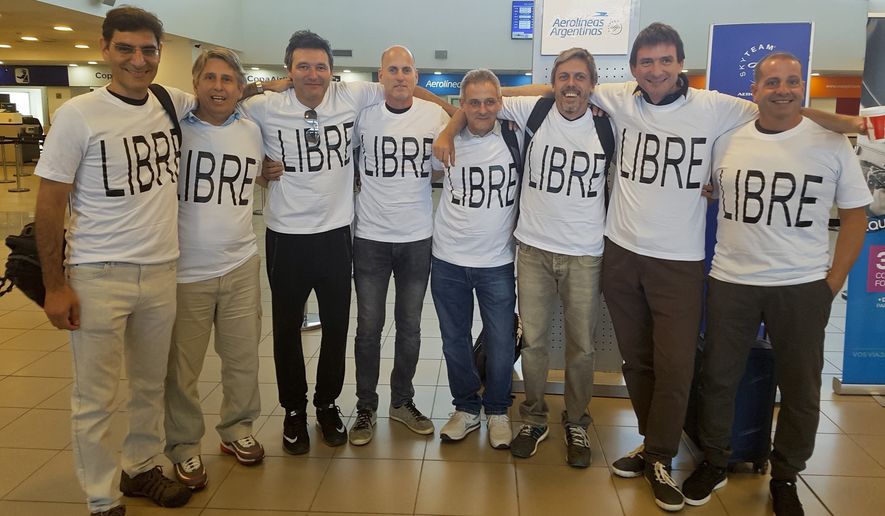BUENOS AIRES — The global war on terror hit home for Argentines this week, even though the attack was carried out in the Northern Hemisphere.
The revelation that five of the eight fatalities in the horrific Islamic State-inspired New York truck rampage were fellow citizens and childhood friends left many here reeling, shaken out of a widespread belief that the country’s distance from U.S. and European terrorism hot spots might keep Argentines relatively immune from the threat of global jihad.
Across the nation — but especially in the victims’ hometown of Rosario, a port city some 180 miles north of the capital — media coverage and everyday conversations were dominated by the tragic end of what started as a heartwarming reunion trip that 10 high school friends were taking 30 years after graduation.
Cellphone video obtained by the TN news channel showed the group chatting and laughing as they pedaled along the West Side Highway bike path, presumably just minutes before the attack.
Five of the men — architects Diego Angelini, Hernan Ferrucchi and Hernan Mendoza, and entrepreneurs Ariel Erlij and Alejandro Pagnucco Charre — were killed at the site, the Argentine Consulate General in the city confirmed. A sixth national, Cambridge, Massachusetts, resident Martin Marro, was reported to be in stable condition at a New York hospital.
The newspaper La Nacion reported that the trip was paid for by Mr. Erlij, the chief executive of Ivanar, an Argentine steel products manufacturing company, The Associated Press reported.
In Rosario, the municipal government decreed three days of mourning and ordered flags to be flown at half-staff. Citing their entrepreneurial spirit, President Mauricio Macri said the country had lost five “protagonists of Argentine society.”
“This shows that there is no place for gray zones in today’s world. All countries must be committed from head to toe in the fight against terrorism,” Mr. Macri said. “We’re committed to a frontal assault. But, even though there has been progress and we work well together, the results aren’t what we hoped for.”
President Trump tweeted Wednesday evening that he “just spoke to President Macri of Argentina about the five proud and wonderful men killed in the West Side terror attack. God be with them!”
The victims’ families asked for privacy and prayers in a joint statement, while authorities pledged a swift return of the bodies to Argentina. Family members were expected to arrive in New York as early as Thursday, according to an Argentine diplomat there.
Hometown disbelief
Rosario, a major agricultural hub, is the country’s third-largest city and may have been best known before Tuesday as the birthplace of revolutionary Che Guevara and global soccer star Lionel Messi.
At Rosario’s Polytechnic Institute, where the former classmates had hoped to attend a Friday reunion upon their return, and at the University of Rosario’s School of Architecture, where four of them had studied, students and faculty were following the developments with a mix of sadness and disbelief.
“Diego Angelini was my student and an assistant at my [university] chair,” architecture dean Adolfo del Rio told The Washington Times. “This really has been a very strong hit for a community as small as ours.”
He is among many in South America who are slowly coming to grips with the fact that terrorism is taking a toll on their lives as well, Mr. del Rio said.
“Undoubtedly, it’s a global question. My son was [just] meters away from the attack in Barcelona, for example, a little while ago,” he said. “It really is a very sad, very worrisome situation.”
But whether terrorism hits close to home or halfway around the world, those incidents show that people have little choice but to fight back, the dean added.
“I myself believe we can’t give in,” he said. “Of course we need to be more and more vigilant [and] fight more and more. But we can’t lock ourselves up in our houses or our countries because we think we’ll be safer.”
In the early 1990s, Argentina was a direct target of Islamist terrorism with the bombings of the Israeli Embassy and a Jewish community center, an attack that killed 114 and was claimed by Hezbollah. But while American and European cities continued in the jihadi crosshairs after Sept. 11, South America has not been a target.
That is partly because in Buenos Aires or Sao Paulo, Islamic State and other jihadi groups can’t draw on pools of would-be converts as sizable as in North American and European cities, said Jytte Klausen, a Brandeis University professor who studies domestic terrorism.
“To carry out an attack, there has to be a batch of willing participants,” Ms. Klausen said. “And it’s a pretty straightforward algorithm: The more people you have that have become integrated to these networks, the greater the threat.”
Still, such groups’ limited presence has not been for a lack of trying, Ms. Klausen added.
“The Islamic State has been a real magnet, and it is one of the big changes that we have seen,” she said. “People from Latin America actually go and join, but their numbers are still tiny.”
While they may now have a more realistic sense of the threat level, Argentines like Mr. del Rio display a sense of fatalism and refuse to give in to “probability neglect,” the outsized fear of becoming a terrorism victim — still highly unlikely anywhere — that the jihadis seek to exploit.
“My son bikes up and down the West Side Highway every morning and every evening. [So] maybe years ago, I would have instantly picked up my phone and said, ‘Are you OK?’” he said about Monday’s attack. “But I didn’t — because the probability that it would be him was just so slim.”




Please read our comment policy before commenting.